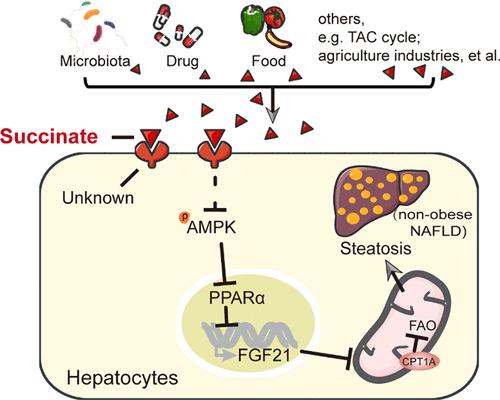当前位置:
X-MOL 学术
›
J. Agric. Food Chem.
›
论文详情
Our official English website, www.x-mol.net, welcomes your
feedback! (Note: you will need to create a separate account there.)
Exposure to Succinate Leads to Steatosis in Non-Obese Non-Alcoholic Fatty Liver Disease by Inhibiting AMPK/PPARα/FGF21-Dependent Fatty Acid Oxidation
Journal of Agricultural and Food Chemistry ( IF 5.7 ) Pub Date : 2024-09-13 , DOI: 10.1021/acs.jafc.4c05671 Hong Yang 1 , Suye Ran 2 , Yuxia Zhou 3 , Qing Shi 2 , Jiangnan Yu 4 , Wenjuan Wang 5 , Chengqin Sun 2 , Dengke Li 6 , Yue Hu 1 , Chen Pan 1 , Qi Yuan 1 , Yunhuan Zhen 7 , Qi Liu 1 , Lingyu Song 1
Journal of Agricultural and Food Chemistry ( IF 5.7 ) Pub Date : 2024-09-13 , DOI: 10.1021/acs.jafc.4c05671 Hong Yang 1 , Suye Ran 2 , Yuxia Zhou 3 , Qing Shi 2 , Jiangnan Yu 4 , Wenjuan Wang 5 , Chengqin Sun 2 , Dengke Li 6 , Yue Hu 1 , Chen Pan 1 , Qi Yuan 1 , Yunhuan Zhen 7 , Qi Liu 1 , Lingyu Song 1
Affiliation

|
Succinate is an important metabolite and a critical chemical with diverse applications in the food, pharmaceutical, and agriculture industries. Recent studies have demonstrated several protective or detrimental functions of succinate in diseases; however, the effect of succinate on lipid metabolism is still unclear. Here, we identified a role of succinate in nonobese nonalcoholic fatty liver disease (NAFLD). Specifically, the level of succinate is increased in the livers and serum of mice with hepatic steatosis. The administration of succinate promotes triglyceride (TG) deposition and hepatic steatosis by suppressing fatty acid oxidation (FAO) in nonobese NAFLD mouse models. RNA-Seq revealed that succinate suppressed fibroblast growth factor 21 (FGF21) expression. Then, the restoration of FGF21 was sufficient to alleviate hepatic steatosis and FAO inhibition induced by succinate treatment in vitro and in vivo. Furthermore, the inhibition of FGF21 expression and FAO mediated by succinate was dependent on the AMPK/PPARα axis. This study provides evidence linking succinate exposure to abnormal hepatic lipid metabolism and the progression of nonobese NAFLD.
中文翻译:

暴露于琥珀酸通过抑制 AMPK/PPARα/FGF21 依赖性脂肪酸氧化导致非肥胖非酒精性脂肪肝疾病的脂肪变性
琥珀酸是一种重要的代谢物和关键化学品,在食品、制药和农业行业具有多种应用。最近的研究表明,琥珀酸盐在疾病中具有多种保护或有害功能;然而,琥珀酸对脂质代谢的影响仍不清楚。在这里,我们确定了琥珀酸在非肥胖性非酒精性脂肪肝 (NAFLD) 中的作用。具体来说,患有肝脂肪变性的小鼠的肝脏和血清中琥珀酸的水平增加。在非肥胖 NAFLD 小鼠模型中,琥珀酸通过抑制脂肪酸氧化 (FAO) 促进甘油三酯 (TG) 沉积和肝脏脂肪变性。 RNA-Seq 显示琥珀酸抑制成纤维细胞生长因子 21 (FGF21) 的表达。然后,FGF21 的恢复足以减轻体外和体内琥珀酸治疗引起的肝脂肪变性和FAO 抑制。此外,琥珀酸介导的FGF21表达和FAO的抑制依赖于AMPK/PPARα轴。这项研究提供了琥珀酸暴露与肝脏脂质代谢异常和非肥胖性 NAFLD 进展之间联系的证据。
更新日期:2024-09-13
中文翻译:

暴露于琥珀酸通过抑制 AMPK/PPARα/FGF21 依赖性脂肪酸氧化导致非肥胖非酒精性脂肪肝疾病的脂肪变性
琥珀酸是一种重要的代谢物和关键化学品,在食品、制药和农业行业具有多种应用。最近的研究表明,琥珀酸盐在疾病中具有多种保护或有害功能;然而,琥珀酸对脂质代谢的影响仍不清楚。在这里,我们确定了琥珀酸在非肥胖性非酒精性脂肪肝 (NAFLD) 中的作用。具体来说,患有肝脂肪变性的小鼠的肝脏和血清中琥珀酸的水平增加。在非肥胖 NAFLD 小鼠模型中,琥珀酸通过抑制脂肪酸氧化 (FAO) 促进甘油三酯 (TG) 沉积和肝脏脂肪变性。 RNA-Seq 显示琥珀酸抑制成纤维细胞生长因子 21 (FGF21) 的表达。然后,FGF21 的恢复足以减轻体外和体内琥珀酸治疗引起的肝脂肪变性和FAO 抑制。此外,琥珀酸介导的FGF21表达和FAO的抑制依赖于AMPK/PPARα轴。这项研究提供了琥珀酸暴露与肝脏脂质代谢异常和非肥胖性 NAFLD 进展之间联系的证据。































 京公网安备 11010802027423号
京公网安备 11010802027423号